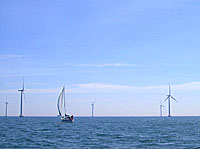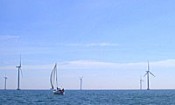 BOSTON, MA – In a televised press conference today, U.S. Secretary of the Interior Ken Salazar announced that the Obama administration had approved the Cape Winds project which could result in 130 electricity generating win turbines being placed in Nantucket Sound off the shores of Cape Cod.
BOSTON, MA – In a televised press conference today, U.S. Secretary of the Interior Ken Salazar announced that the Obama administration had approved the Cape Winds project which could result in 130 electricity generating win turbines being placed in Nantucket Sound off the shores of Cape Cod.
The project which has been debated for almost a decade draws a lot of criticism from Cape residents and even from some environmentalists who believe the project will detract from the natural marine beauty of the coastal area.
The late Senator Edward Kennedy, (D. MA), was opposed to the project, but some say his decision was influenced by the fact that the 6-acre “Kennedy Compound” in Hyannisport is on the shores of Nantucket Sound and its waterfront view would be affected by the wind farm.
Senator John Forbes Kerry, (D. MA), who initially said he supports clean energy like wind farms, but was opposed to the Nantucket Sound location. Kerry has been silent on the subject for some time, but now says he “supports the decision of the Obama administration and Governor Patrick. Not so coincidentally, the Forbes branch of Kerry’s family tree owns all of the Elizabeth Islands except Cuttyhunk and Penikese where Kerry owns a summer home and the islands are located between Nantucket and Cape Cod.
While President Obama says he wants the US to lead the way with clean energy, we are years behind Europe and other regions in getting into the market. Today Germany also announced the construction of a $2.4 wind farm project. Cape Winds is the first wind farm project approved for construction in U.S. waters, but wind farms have already been constructed and are generating clean energy in several other countries including Denmark, Sweden, the Netherlands, Ireland, Spain, and even China.
Others protest the installation of the Cape Wind project saying it is an insult to Native Americans who live in the area — while still others simply think the windmills will be ugly or scoff at the project’s estimated $1 billion price tag.
The complaints most often cited are the size and visible detraction from natural surrounding, and some that live close to the farm have complained about the howling noise caused by the spinning turbines. Still, since these power plants consume no fuel, emit no air pollution and have a relatively low impact on their surroundings, they seem destined to become part of the landscape and seascape in more and more locations.
What is most certain is that Cape Wind will be a political football for the upcoming mud-slinging and flip-flopping season.
For more info on Cape Winds, visit: www.capewind.org
###
